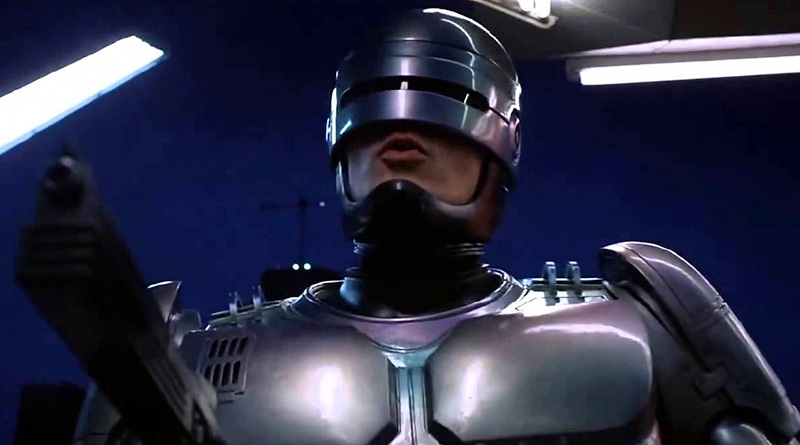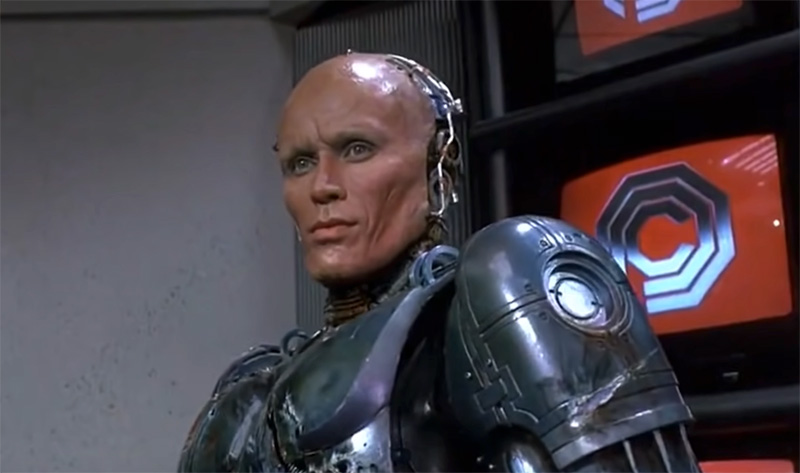
In 1987, audiences were introduced to a futuristic Detroit, a city plagued by crime and corporate greed, through the lens of Paul Verhoeven’s “RoboCop.”
At first glance, the film might seem like a straightforward action-packed sci-fi thriller, but beneath its metallic exterior lies a biting satire that delves deep into the socio-political issues of the era.
Corporate Greed and Dehumanization

One of the most evident themes in “RoboCop” is the unchecked power of corporations. The mega-corporation OCP (Omni Consumer Products) is portrayed as a profit-driven entity with little regard for human life.
Their plan to privatize Detroit’s police force and replace them with robotic enforcers is a stark commentary on the dangers of allowing corporations to have unchecked power over essential public services.
The transformation of Officer Alex Murphy into RoboCop, devoid of his memories and humanity, symbolizes the dehumanization that can occur when profit is prioritized over people.
Media Manipulation

Throughout the film, Verhoeven cleverly integrates satirical news broadcasts and commercials. These segments not only provide comic relief but also highlight the media’s role in shaping public perception. The overly cheerful news anchors reporting on global catastrophes with a smile is a jab at the media’s tendency to trivialize serious issues, presenting them as mere entertainment.
Militarization of the Police
RoboCop, with his advanced weaponry and armor, is the epitome of the militarized police officer. Verhoeven uses this to comment on the increasing militarization of police forces around the world.
The film questions the ethics of using extreme force in law enforcement and the potential consequences of blurring the lines between the military and the police.
Critiquing and Commodifying Violence

Verhoeven chose the vehicle of an over-the-top 80s action flick to deliver his satire, making Robocop as much a part of the culture as it was commenting on it.
The film indulges in the same gratuitous violence that it condemns, with blood squibs and gore galore. Robocop himself doles out savage justice without an ounce of mercy.
Yet this parody of detached, ruthless vigilantism is exactly the point. Robocop is the ultimate 80s shoot-em-up fantasy, an unfeeling humanoid machine delivering cathartic vengeance that audiences ate up.
Even as Robocop made a spectacle of the decade’s fascination with hyperviolence, it profited from that appetite like any other product.
The irony is that the movie decried turning violence into mass entertainment even as it reveled in being a commercial, pop culture success.
According to Verhoeven, people would even cheer the movie’s most brutal scenes. Robocop simultaneously satirized and embodied the evils of commercialization that it railed against.
The “Happy” Ending

The ending of Robocop has a veneer of a triumphant, happy resolution, but further analysis reveals a much more cynical message. Despite taking down Dick Jones, the corporate corruption at the heart of OCP remains intact.
The old Detroit that Robocop fought for is still being torn down in the name of profit. Murphy may have avenged his own death, but he remains a prisoner in his own body, more product than man.
Robocop’s final gun twirl is an eerie mirror of the mindless entertainment violence the film criticizes. Verhoeven’s signature blend of brutal violence and dark humor underscores the point: justice has not truly been served.
The system remains unchanged, the corporate overlords unpunished. Robocop himself is still enslaved, his humanity overwritten by programming. The upbeat tone of the ending clashes jarringly with the lack of meaningful change achieved. V
So while on the surface Robocop is just another 80s sci-fi spectacle, it had a lot more going on under the hood. Verhoeven embedded the film with themes exploring corporate power, dehumanization, media influence, and the dark side of America’s psyche.
Robocop was an entertaining Trojan horse that critiqued the very cultural landscape that produced it.

Theodore Lee is the editor of Caveman Circus. He strives for self-improvement in all areas of his life, except his candy consumption, where he remains a champion gummy worm enthusiast. When not writing about mindfulness or living in integrity, you can find him hiding giant bags of sour patch kids under the bed.